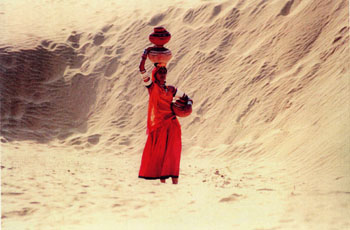![[Metroactive Movies]](/movies/gifs/movies468.gif)
[ Movies Index | Show Times | Silicon Valley | Metroactive Home | Archives ]
Dire Straits
The lower the caste, the harder the pursuit of justice in Indian drama 'Sandstorm'
By Michael S. Gant
THE OPENING SCENES of Jagmohan's Sandstorm dazzle the eye with visions of village women in the desert dunescape of rural Rajasthan in northwest India. Clad in flowing garments dyed in the brightest of gold, red and yellow, the women pop out from the sere backdrop. The clothes are as assertive as the women are beholden to tradition. A caste within a caste-stratified society, they are betrothed as child brides, stripped of choices and opportunities. Sanwari (Nandita Das), however, bridles under such restrictions, even though she belongs to a low caste of potters. Her spark of rebellion attracts the attention of Shobha Devi (Deepti Naval), a government worker who organizes the local women in an effort to teach them about their legal rights. She persuades Sanwari to take a job as a village activist.
Predictably, the men of the village--except for Sanwari's saintly husband, Sohan (Raghuvir Yadav)--don't take kindly to Sanwari's new occupation, spitting out invectives like "low-caste bitch." Eventually, the name-calling escalates to violence when some upper-caste men, including the local priest, ambush Sanwari and Sohan, beating him and raping her. Bloodied but undaunted, Sanwari begins a painfully long odyssey to bring her attackers to justice.
Sandstorm is based on a true story of great perseverance. As a lesson in empowerment and women's rights, it delivers a powerful message. Unfortunately, despite the colorful costumes, Jagmohan lays out the story in a black-and-white schematic that makes the average silent melodrama look nuanced by comparison. The upper-caste abusers bug out their eyes, twirl their mustaches and smirk like dinner-theater villains, their dastardly moves signaled by sinister strains on the soundtrack. Every time, you think that Sanwari has suffered enough, another indignity is heaped upon her, as if she were the heroine of a Marquis de Sade novel. The local police officer demands that she disrobe in front of him so that he can keep the dress as evidence; a politician promises justice but delivers cronyism; the defense lawyer cruelly cross-examines her about the possibility that she actually enjoyed the attack. When Sanwari must spend a night in protective custody, even the female goalers make crude jokes about her predicament. The boorishness of the male species spreads even to Shobha's husband, a university professor who reveals his true colors when he and his cronies start telling dirty jokes.
Here and there, Jagmohan demonstrates a keen eye for caricature. The society feminists who rally to Sanwari's cause when it looks ripe for a publicity blitz cluck approvingly about the peasant chic of her home ("I love this cow-dung finish," gushes one) while disdaining her drinking water for fear of germs. In a framing device that slows down the narrative, a fatuous English journalist and her boyfriend try to piece together the story, which is told in flashback. These scenes merely slow down an already overly long tale of woe. Luckily, the didactic tone does nothing to dim the performance of Das. Even in the deepest of degradations, she manages to find a core of quiet resilience.
[ Silicon Valley | Metroactive Home | Archives ]
![]()

Injust Desert: Nandita Das embarks on a long, hard journey in the Indian film 'Sandstorm.'
Sandstorm (Unrated; 125 min.), directed and written by Jagmohan, photographed by Ashokl Kumar and starring Nandita Das, Raghuvir Yadav and Deepti Naval, opens Friday at Camera One in San Jose.
Send a letter to the editor about this story to letters@metronews.com.
From the March 27-April 2, 2003 issue of Metro, Silicon Valley's Weekly Newspaper.